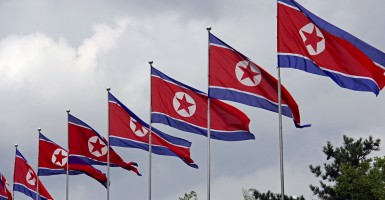North Korea is a land of “signals” where every action, good or bad, seems some sort of clever harbinger of change.
The regime fires a short-range rocket? It’s a signal of Pyongyang’s displeasure with U.S. policy…and a cry for renewed diplomatic engagement.
It allows a foreign journalist, sports team or cultural group to enter North Korea? An acknowledgement by the regime of the need to implement political and economic reform and a heartfelt plea for….wait for it….renewed diplomatic engagement.
This week, North Korea seems awash—perhaps even aflood—with such signals. Japanese legislator and former pro wrestler Kanji Inoki organized an International Pro Wrestling Festival in Pyongyang to thaw relations between North Korea and Japan. A rapper filmed his ALS ice bucket challenge in Pyongyang and, until Seoul refused to pick up the tab with taxpayer money, Pyongyang was going to send more than 300 cheerleaders to the Asian Games in South Korea.
On a more serious note, CNN was allowed to videotape three American detainees as they pleaded for a U.S. envoy to secure their release in a scene disturbingly like a hostage pleading with ISIL. North Korean Foreign Minister Ri Su-yong will attend the UN General Assembly in late September, the first time a senior official has attended in 15 years. Kang Sok-ju, secretary of the Central Committee of the Workers’ Party of Korea and former vice foreign minister, is making a rare trip to Europe.
But, as Sigmund Freud was reputed to have said, “Sometimes a cigar is just a cigar.” If North Korea’s various gestures are meant as signals, they’re not very good since they are imprecise, ambiguous and subject to misinterpretation. Signals work only when both sides know what they mean, as in semaphore code or a military salute.
Western experts have a long history of overeagerly predicting North Korean reform. A former U.S. ambassador to South Korea gushed that the New York Philharmonic’s 2008 concert in Pyongyang was “firing a 16-inch broadside of soft power into the hearts and minds of the North Korean people.” The two Koreas walking together into the 2000 Sydney Olympics was perceived as another step toward reconciliation following the first inter-Korean summit. Muhammad Ali traveled to North Korea in 1995 as part of a wrestling extravaganza billed as the International Sports and Cultural Festival for Peace that featured Inoki.
But none of those events led to the slightest political or economic reform, alteration of Pyongyang’s quest for nuclear weapons or reduction in the regime’s threats. Moreover, Pyongyang’s “signals” also are subject to manipulation by focusing on rumored economic changes or growing cell phone usage but ignoring North Korean military threats. Some experts even point in Sherlock Holmesian fashion to the dog that didn’t bark, i.e. the signal North Korean sent by not saying something.
If North Korea wants to signal its desire for renewed dialogue, perhaps it could stop threatening the U.S. and its allies with nuclear attacks, stop violating UN resolutions prohibiting missile tests and return to its pledge to abandon its nuclear weapons programs. Or it could call for Dennis Rodman to come back and serve as an envoy.































